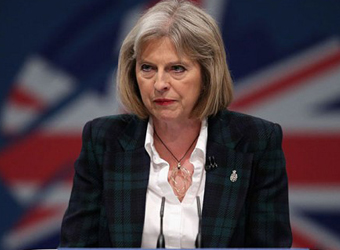A British-born man who was once investigated for connections to violent extremism carried out the deadly attack outside Parliament in London on Wednesday, said Prime Minister Theresa May on Thursday.
Addressing lawmakers in Parliament who only a day earlier had been under lockdown, May said on Thursday morning that the attacker was “a peripheral figure” who had been examined by MI5, Britain’s domestic counterintelligence agency, but who had not been “part of the current intelligence picture.”
May said that officials were not ready to release the man’s name, but she added that “there was no prior evidence of his intent or of the plot” and that “our working assumption is that the attacker was inspired by Islamist ideology.”
The authorities raided six properties across the country on Thursday, detaining eight people in London and in Birmingham, in central England, as they pressed ahead with a fast-moving investigation. The authorities emphasized that they believed the assailant had acted alone and that they did not expect any further attacks; May said that the nation’s threat level would remain “severe,” meaning that an attack was likely, and not raised to “critical,” signaling an imminent attack.
“Yesterday, an act of terrorism tried to silence our democracy,” May said, adding: “We are not afraid and our resolve will never waver in the face of terrorism.”
Among the victims of the attack — three dead and around 40 others wounded — were 12 Britons, at least four South Koreans, three French schoolchildren, two Romanians and one citizen each of China, Germany, Greece, Ireland and Italy.
As Londoners returned to work Thursday morning and Parliament resumed normal business — it began with a debate on trade policy before Mrs. May spoke — police officers were pursuing leads in the case.
The police also said that they had lowered the death toll in the attack on Wednesday to four from five, including the assailant, who drove his vehicle over pedestrians on Westminster Bridge and then fatally stabbed a police constable, Keith Palmer, 48, before being shot dead by the police.
“We’re dealing with an enemy, a terrorist enemy, that is not making demands or taking people hostage, but simply wants to kill as many people as possible,” the British defense secretary, Michael Fallon, told the BBC. “This is a new element to international terrorism.”
Fallon added that the police had “forestalled a large number of these attacks in recent years, over a dozen last year.”
Questions about the assailant continued to swirl. The authorities have declined to identify him, reveal his nationality or say if he was part of a wider network.
Rowley, the assistant commissioner, said that a large crime scene remained near Parliament and that the police would be sifting through CCTV footage as well as video evidence taken by witnesses. The investigation, he said, was focused on the assailant’s motive, on identifying his associates, and on the extent to which the attack was premeditated.
Unsurprisingly for a multicultural city like London — where a moment of silence was held at 9:33 a.m. on Thursday, to be followed by a vigil in the evening — people from several nationalities were among the victims, Rowley said. He appealed for calm, saying, “We must not allow terrorists to sow discord and fear in our city.”
In Parliament, the secretary of state for international trade, Liam Fox, began taking questions on trade issues by stating that it would be “not violence, hatred or division, but decency, goodness and tolerance that prevails in our country.”
Speaking outside the chamber, Ed Miliband, a former leader of the Labour Party, said that the mood had been one of “shock and determination and also admiration for the job that the security people are doing.” The reaction, he added, showed that “humanity is stronger than the cowardice and depravity of the person who did this.”
Source: The New York Times


